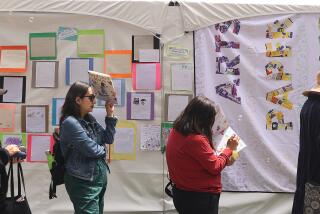Kay Ryan and Billy Collins to wax poetic and playful at Royce Hall
After reading a truly good poem, one finds it hard to look at the world in quite the same way again. And to share that awakening with other people in a live reading is one of the joys of the form, as the poet fills the room with transformations as though the words were reinventing themselves.
This weekend, newly announced 2011 Pulitzer Prize winner Kay Ryan joins fellow poet Billy Collins at UCLA’s Royce Hall to read their work and tilt the world ever so slightly off its axis. Both are former U.S. poets laureate, and Ryan won the Pulitzer for her book “The Best of It,” a collection of new and selected poems. Collins, whose works include “The Trouble With Poetry” and “Sailing Alone Around the Room,” is among the most popular and widely read of contemporary American poets.
Ryan and Collins have somewhat similar backgrounds: Both taught college for many years and were recognized for their poetry later in their careers, and as Collins said, “I think because of that, we both have a severe distaste for pretentiousness in poetry or other literary endeavors.”
As U.S. poet laureate, Collins, who served from 2001 to 2003, and Ryan, who served from 2008 to 2010, each used the appointment to raise awareness of poetry in schools: Collins in high schools and Ryan in community colleges.
Though their lives contain parallels, in terms of their poetry, Ryan said, “I don’t think we’re very similar at all, except we both really love to make an audience laugh. When we’re performing, we both really, really want the audience to have a good time and to speak to us in laughter.”
Carol Muske-Dukes, a professor at USC and the current California poet laureate, said both poets seduce readers with their wit, charm and accessible language.
“The difficulty of the craft and the extreme expertise and vision of those poems,” she said, “is hidden by the illusion of ease.”
Collins and Ryan, who have read together on many occasions, share a kind of playful antagonism. “We enjoy making fun of each other in a very good spirit,” Collins said. “And I, of course, admire her poems tremendously.”
Ryan’s poems are sharp and tight, and their austere forms disguise their depth. In “A Ball Rolls on a Point,” a single sphere rolling along invokes the weight of the world: “The whole ball / of who we are / presses into / the green baize / at a single tiny / spot.”
As Collins said, “Her poems embody probably more than any living poet an attribute that tends to distinguish poetry from all other forms, and that is compression. Her poems are incredibly compact. I’m not just talking about shortness — there’s a kind of density of meaning and particularly a density of sound.”
That density of sound makes her poems well-suited to reading aloud, and Ryan treats her readings as performances. “I also use the bass pedal on my rhymes sometimes when I’m reading aloud,” she said, referring to her sometimes heavy stress on certain words, “so that I really emphasize them for the sheer fun of getting people to hear it.”
But Ryan also warned that her entertaining presentations can belie the uncomfortable content at the core of her poems. In an interview in the Paris Review, she compared her poems to fairy gifts that would later change and become frightening.
When asked what she admired about Collins’ work, Ryan cited the transformation of the familiar: “In a way, I enjoy what so very many people enjoy, and that is the easy, inviting tone and pace of his work, where he walks you down a path and the path gets much more interesting and funnier than you knew.”
A typical Collins poem begins in an ordinary place but takes the reader elsewhere, somewhere surreal. In “Another Reason Why I Don’t Keep a Gun in the House,” the simple act of playing music to drown out a dog’s barking ends with the image of the dog barking along in an orchestra, “while the other musicians listen in respectful / silence to the famous barking dog solo, that endless coda that first established / Beethoven as an innovative genius.”
As Muske-Dukes said, “It’s making what is familiar new, making what we think we understand, what we see all the time, new to us.”
Whether on the page or read aloud, that subtle shift — when a witty observation envelops an uncomfortable truth, when a journey leaves a well-known place and ventures somewhere strange — is where the poet’s art resides.
Where: Royce Hall, UCLA, 340 Royce Drive, L.A.
When: 8 p.m. Saturday
Tickets: $28-$53 general admission, $15 UCLA students
Info: (310) 825-2101; https://www.uclalive.org
More to Read
The biggest entertainment stories
Get our big stories about Hollywood, film, television, music, arts, culture and more right in your inbox as soon as they publish.
You may occasionally receive promotional content from the Los Angeles Times.










